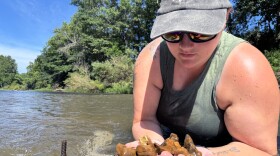
Celia Llopis-Jepsen
Reporter, Harvest Public MediaI'm the creator and host of the environmental podcast Up From Dust. I write about how the world is transforming around us, from topsoil loss and invasive species to climate change. My goal is to explain why these stories matter to the Midwest and Great Plains, and to report on the farmers, ranchers, scientists and other engaged people working to make the region more resilient.
I previously covered environment and other beats for the Kansas News Service.
I have a master's in journalism from Columbia University and a master’s in bilingualism studies from Stockholm University in Sweden. Before coming to Kansas, I spent a decade living and working in Sweden, Germany and Taiwan, including several cherished years working for the Taipei Times.
Email me at celia@kcur.org.
-
The Prairie Band Potawatomi Nation is one of the first hemp fiber processors in Kansas, and wants the investment to benefit both the tribe and the environment. The new products include insulation and compostable cutlery.
-
The Prairie Band Potawatomi Nation’s agriculture business grows hemp without irrigation, insecticides or plowing. Now its product is helping to build a home in Ogden.
-
As we embark on our third year of Up From Dust, we discuss why we started an environmental podcast in the Midwest — and what we’ve learned along the way. In 2026, stay tuned for stories about farmers, astronomers, turtles, bats and more. We’ll overcome fears and rethink how we grow food and build our cities. And we’ll meet the people in the Heartland who tackle the challenge of climate change with determination and resolve. Thanks for coming along with us.
-
This past semester, Kansas State University relaunched the nuclear engineering major that it discontinued in 1996. It has already attracted more than 50 students.
-
In one long-polluted Ozark river, the little fish darting through the water and the rare mussels hiding on the pebbly bottom tell a story worth celebrating. They’re signs that the Spring River is benefitting from environmental cleanups after a century of mining pollution. A professor and his students are uncovering the evidence of recovery. But there’s a twist: They’ve also found a new environmental challenge unfolding farther upstream.
-
The fish and rare mussels hiding in the Spring River that flows through Kansas and Missouri are signs that environmental cleanups are helping river wildlife recover from a century of mining pollution.
-
Deep Fission says it plans to install a nuclear reactor underground at an industrial park in southeast Kansas. State and local government leaders are on board. It’s part of a national push for new nuclear energy generation.
-
Animals that disappeared from some rivers because of pollution, dams and overharvesting are getting a new lease on life that could have ripple effects for other wildlife and for humans.
-
Trevor Starks is on a mission. He wants to help the humble but powerful creatures that clean the waters of the Neosho River: freshwater mussels. For decades, their populations dwindled due to overharvesting, pollution and dam construction. To right the wrongs of the past, Trevor and his colleagues are releasing rare mussels by the hundreds. Now, the only thing left is to find out if it worked.
-
Two companies are pursuing two very different visions for building and operating nuclear reactors in Kansas.








